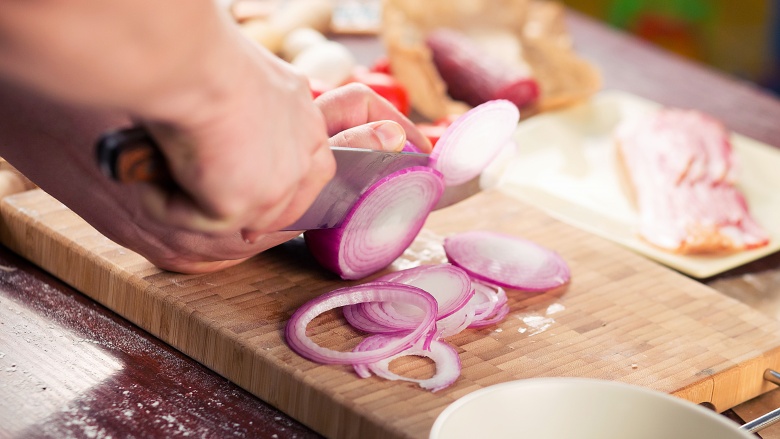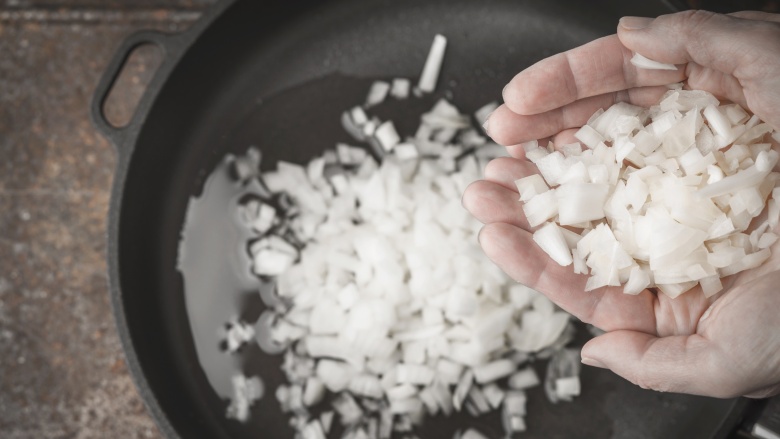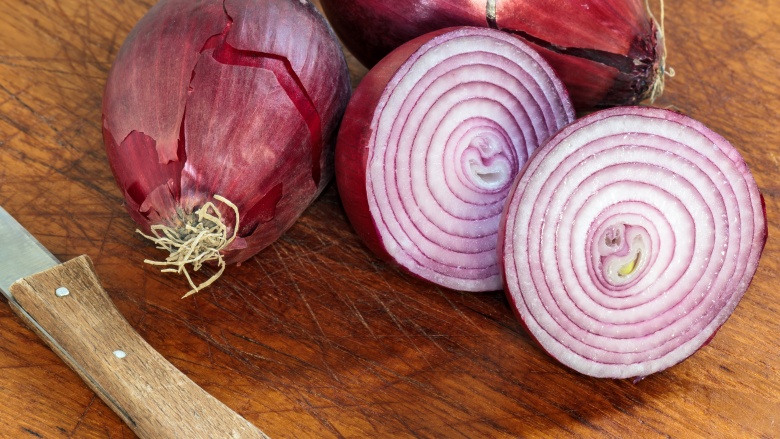The Real Reason Onions Make You Cry
Even if you love the taste of onions, chances are good that you hate cutting them. The burning sensation, the tears, and if you've ever made the mistake of wiping your eyes with your hand? You're in for a world of hurt. But there's some pretty neat science going on in your kitchen when you're chopping onions, and knowing why you're finding yourself brimming with tears is the first bit of knowledge you need if you want to prevent that flow. And who doesn't want to cry less?
The science behind onions and crying
Can you imagine having to cook without onions? For all the tears and all the burning eyes, they elevate so many dishes to the next level. In order to understand what it is that makes you have such a reaction to them while you're cutting them (but still love eating them), let's get scientific.
Onions, along with their close relatives like garlic, belong to a family of plants called allium. When onions grow, one of the things they absorb from the soil is sulphur. As they do, they turn the raw sulphur into an amino acid called sulfoxide, and sulfoxides have a pretty neat characteristic: they react with their environment to form a gas. Cutting into an onion means that you are, of course, cutting through individual, microscopic onion cells and as you do, the sulfoxide reacts to form a tongue-twisting gas called syn-propanethial-s-oxide. Unfortunately, there's no easy way to say or remember that particular name, but what happens next is pretty straightforward. The gas acts as gases do and rises up from the chopped onions. Receptors in your eyes recognize the presence of an unfamiliar gas, and communicate with your brain to start the tears flowing in order to help protect your eyes from this compound.
The gas is only released when you're cutting onions. The process of cooking them gets rid of all the gas. Once the onions are heated, the molecules that form that gas? They become inert, and onions go from offensive to wonderful thanks to those same enzymes, which are at least partially responsible for giving onions their flavor.
How can you keep from crying?
No one likes this part of cooking (aside from, perhaps, a few strange, strange people). Cutting onions can screw up your whole rhythm, especially when you have to wait for your eyes to stop burning before you can focus on your next task. Needless to say, there are a ton of recommended methods out there for keeping onions from ruining your evening, but many of them don't work. Some are downright silly, especially now that you know the science behind what's going on. Want to beat the tears? These tried-and-true methods are based in science.
Just like the heat of cooking keeps onions from releasing the gas that makes you cry, cold stops the gas-forming enzymes in onions as well. It slows down the rate at which the gas is made and released, so putting your onions in the refrigerator or in the freezer before you're getting ready to cut and cook with them is one way to make dinner prep a lot less painful. The National Onion Association also recommends leaving the root end of the onion un-cut, as that's the part that has the greatest concentration of gas-releasing enzymes.
Turning on your stove's vent hood will also help relieve some of the tears, but not all of the tear-causing gas will get whisked away by the hood before reaching your eyes. It's probably better than nothing, though. You've likely heard that cutting onions underwater keeps the tears from coming, and it's based on the same principle of interrupting the gas flow. It might be a bit dangerous to work out logistically, though, so you're probably better off with another option. At worst, you can grab some goggles and cover up.
Getting the onion smell off your hands
The thing about onions is that even after you've chopped them and thrown them into whatever recipe you're making, you can probably still smell them. The gas lingers, and the smell stays on your hands for an incredibly long time. No matter how well you wash them or what kind of soap you use, that oniony scent just stays.
There are a couple things that you can try. The first involves something you already have in your kitchen cupboard and, perhaps, your refrigerator. Baking soda's odor-neutralizing properties are well-known, and it can help you wash that onion smell off your hands, too. The National Onion Association recommends washing your hands with lemon juice to neutralize the pungent smell. Another rumor you might have heard involves specifically designed products, although the scientific jury is still out. Rubbing your hands on stainless steel (or a stainless steel soap bar), supposedly kick-starts a chemical reaction that causes the gas-and-odor causing molecules to bond to the metal surface instead of your skin. Some swear by it, while others aren't as convinced. When University of Pittsburgh chemists gave this remedy a try, they weren't convinced that it did much of anything. If you want to try it, you don't need to buy a special product — any stainless steel you already have in your kitchen will work for a test.
A tear-free onion?
The same chemicals that cause you to tear up when you're cutting onions is what makes them such a valuable addition to your kitchens and your recipes, so if you're not sure how to feel about this one, I can't blame you. The red onions, called Asda sweet red onions, were developed over the course of 20 years by selectively crossing hundreds and hundreds of onions to breed a new strain specifically for its lack of enzymes. Like the name suggests, the onions are less pungent and more sweet than other types of red onions, and the British farmer who created the strain also says that they don't leave that distinctive aftertaste that so many onions can.
Sure, cutting onions is a pain, but that's what makes them onions, after all. Even if these tear-free onions catch on, it's doubtful they'll ever completely replace the onions that we have today. You probably don't want them to, either!




